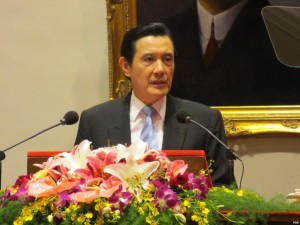Mending the 66-year-old Cross-Strait Relationship Finds Trouble in Taiwan
Pro-independence protestors filled up Taiwan’s airport and streets with signs and slogans calling Taiwanese President Ma Ying-jeou a traitor, as the President Xi Jinping and President Ma Ying-jeou held a historic talk in Singapore on Nov. 7, the first meeting between the leaders of China and Taiwan since their division in 1949.

“Today will be remembered in history,” Xi said. “Both sides belong to one country. That fact and legal basis has never changed, and will never change.”
Ma, dressed in a blue tie, complemented Xi’s remark.
“We are sitting together today to prevent the historical tragedy from repeating itself, prevent the fruits from peaceful development of cross-Strait ties from being lost again, enable compatriots across the Strait to continue to create a peaceful life, and enable our next generations to share a bright future,” Ma said.
The two sides of the Taiwan Strait enjoyed over 66 years of uneasy tensions due to a civil war that ended in Mao Zedong’s Communist Party’s victory and Chiang Kai-shek’s Kuomintang fleeing to Taiwan. The two parties even confronted each other militarily in the 1950s, leading to over thousands of artillery bombardment in Quemoy and Amoy.
China and Taiwan reached 23 agreements after Ma’s Kuomintang reclaimed political power in 2008. Annual trade was worth over 190 billion dollars and 9 million people have crossed the Taiwan Strait in 2014.
The meeting, however, was more symbolic than substantive. The actual dialogue was held for about an hour. No joint statements or press conferences followed the meeting.
Most of the dialogue was devoted to reaffirm the 1992 one-China policy. Under this consensus, both sides agreed to the principle of one China, but the terms were left ambiguous for their own interpretation.
Utilizing the 1992 basis, Ma suggested increasing cultural exchange and installing hot-lines as a means of moving forward with amicable terms. Xi responded by offering a joint-published history book detailing the Japanese colonial era and welcoming Taiwan’s entry into Asian Infrastructure Investment Bank in the future.
Experts see this summit as Ma’s pitch for Kuomintang’s survival in the upcoming election in January. Tsai Ing-wen, leader of Taiwan's main opposition Democratic Progressive Party (DPP), is currently leading the polls for the next presidential race. Her electoral triumph may raise concerns for China as DPP holds a pro-independence platform.
The Chinese government passed a law that made secession illegal for Taiwan in 2005, last time DPP was in power. The law also authorizes the use of military force in case Taiwan chooses to pursue such course of action.
“We are very disappointed that the only achievement from this meeting is supporting Ma’s attempt to use political frameworks to limit people’s future choices on the cross-straits issue,” Tsai said. “President Ma departed with people’s doubts of under-table operation, and he is going to bring back bigger controversy with him.”
